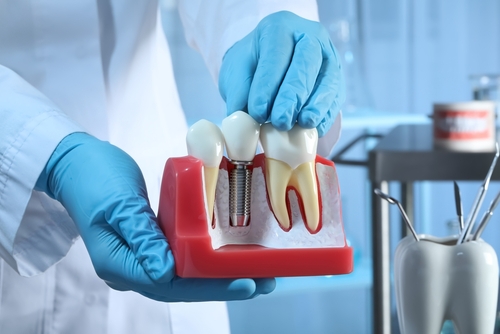Dental implants are a permanent and successful way to replace missing teeth, revolutionizing the field of dentistry. Dental implants, which are surgically inserted into the jawbone as opposed to conventional dentures or bridges, provide a stable and lifelike replacement for single or several missing teeth.
The ability of dental implants to mimic the appearance and functionality of natural teeth is one of their key benefits. An artificial tooth root firmly anchored into the jawbone, the implant functions as one. This gives the prosthetic tooth or teeth attached to the implant stability and support. People can eat, speak, and confidently smile thanks to dental implants’ natural-feeling bite.
Dental implants typically require several steps in the procedure. A thorough examination and consultation with a dental expert must first be completed to determine if the patient is a good candidate for the procedure. It is evaluated how many teeth are missing, how healthy the mouth is overall, and how dense the jawbone is.

The dental implant procedure starts with placing the implant into the jawbone if the patient is qualified. This is carried out under local anesthesia to ensure comfort throughout the procedure. The implant is typically made of titanium, a biocompatible material that enables osseointegration, a process by which the implant fuses with the surrounding bone. The prosthetic tooth has a solid and long-lasting foundation thanks to this integration.
For osseointegration to occur after the implant has been placed, a healing period of several months is usually necessary. During this time, the bone tissue’s growth and bonding with the implant ensures the implant’s stability and longevity. Occasionally, a temporary tooth replacement may be offered during the healing process.
The final step is to affix the prosthetic tooth or teeth to the implant once it has completely fused with the jawbone. An abutment, which serves as a connector between the implant and the false tooth, is typically used to accomplish this. To ensure a seamless and natural appearance, the prosthetic tooth is explicitly made to match the patient’s natural teeth color, shape, and size.
Comparing dental implants to other tooth replacement options, they have a number of advantages. Unlike dentures, implants are fixed in the mouth, so they don’t need to be removed for cleaning or maintenance. Additionally, they do not rely on nearby teeth for support, which helps maintain the integrity of the natural teeth that are still present. Additionally, implants stimulate the jawbone, stopping bone deterioration and maintaining facial structure.
Proper maintenance is essential for dental implants to succeed over the long term. This entails maintaining good oral hygiene, such as regular brushing and flossing, and going to the dentist for checkups and cleanings. Avoiding behaviors that can harm the implant, such as biting down on hard objects or using your teeth as tools, is important.
In conclusion, dental implants are a practical and durable way to replace lost teeth. They provide many advantages, such as enhanced oral health, a more natural appearance, and jawbone preservation. The process involves surgically inserting the implant, allowing it to heal, and affixing a specially-made prosthetic tooth. Dental implants can give you a confident smile and improve oral health for many years with the right upkeep.